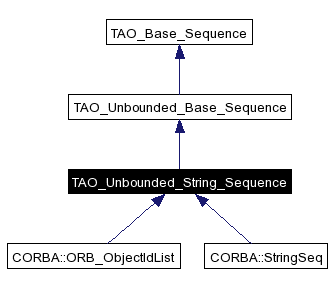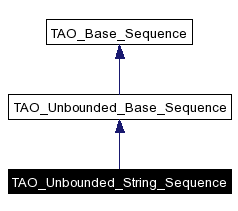
#include <Sequence.h>
Inheritance diagram for TAO_Unbounded_String_Sequence:


IDL sequences of strings must automatically duplicate and release their members based on some global <release> flag.
|
|
{orbos/97-05-15:16.8} The default constructor initializes object reference members to appropriately typed nil object references and string members to NULL; all other members are initialized via their default constructors. {orbos/97-05-15:16.11} For both bounded and unbounded sequences, the default constructor (as shown in the example above) sets the sequence length equal to 0. |
|
|
Unbounded sequences provide a constructor that allows only the initial value of the maximum length to be set (the ``maximum constructor'' shown in the example above). This allows applications to control how much buffer space is initially allocated by the sequence. This constructor also sets the length to 0 and the release flag to TRUE. |
|
||||||||||||||||||||
|
The ``T *data'' constructor (as shown in the example above) allows the length and contents of a bounded or unbounded sequence to be set. For unbounded sequences, it also allows the initial value of the maximum length to be set. For this constructor, ownership of the content's vector is determined by the release parameter---FALSE means the caller owns the storage, while TRUE means that the sequence assumes ownership of the storage. If release is TRUE, the content's vector must have been allocated using the sequence allocbuf function, and the sequence will pass it to freebuf when finished with it. |
|
|
The copy constructor performs a deep copy from the existing structure to create a new structure, including calling _duplicate on all object reference members and performing the necessary heap allocations for all string members. The copy constructor creates a new sequence with the same maximum and length as the given sequence, copies each of its current elements (items zero through length-1), and sets the release flag to TRUE. |
|
|
The destructor releases all object reference members and frees all string members. |
|
|
Ensure that the buffer contains space for at least <length> elements. The constructor must be called for any new elements, the old ones (if any) must be copied into the buffer using operator= and then their destructors must be called. Finally the old buffer must be released. Implements TAO_Base_Sequence. |
|
|
Must deallocate the buffer and then set it to zero.
Implements TAO_Base_Sequence. |
|
||||||||||||
|
Some sequences (of objects and strings) require some cleanup if the sequence is shrunk. The spec requires the destructor to release the objects only from position <0> to <length-1>; so shrink and then delete could result in a memory leak. Reimplemented from TAO_Base_Sequence. |
|
|
Reimplemented in CORBA::StringSeq. |
|
|
The allocbuf function allocates a vector of T elements that can be passed to the T *data constructor. The length of the vector is given by the nelems function argument. The allocbuf function initializes each element using its default constructor, except for strings, which are initialized to null pointers, and object references, which are initialized to suitably typed nil object references. A null pointer is returned if allocbuf for some reason cannot allocate the requested vector. Vectors allocated by allocbuf should be freed using the freebuf function. |
|
|
The freebuf function ensures that the destructor for each element is called before the buffer is destroyed, except for string elements, which are freed using string_free(), and object reference elements, which are freed using release(). The freebuf function will ignore null pointers passed to it. |
|
|
|
|
|
|
|
|
The assignment operator first releases all object reference members and frees all string members, and then performs a deepcopy to create a new structure. The assignment operator deepcopies its parameter, releasing old storage if necessary. It behaves as if the original sequence is destroyed via its destructor and then the source sequence copied using the copy constructor. If release=TRUE, the destructor destroys each of the current elements (items zero through length--1). For an unbounded sequence, if a reallocation is necessary due to a change in the length and the sequence was created using the release=TRUE parameter in its constructor, the sequence will deallocate the old storage. If release is FALSE under these circumstances, old storage will not be freed before the reallocation is performed. After reallocation, the release flag is always set to TRUE. |
|
|
read-write accessor
|
|
||||||||||||||||||||
|
|
 1.3.9.1
1.3.9.1